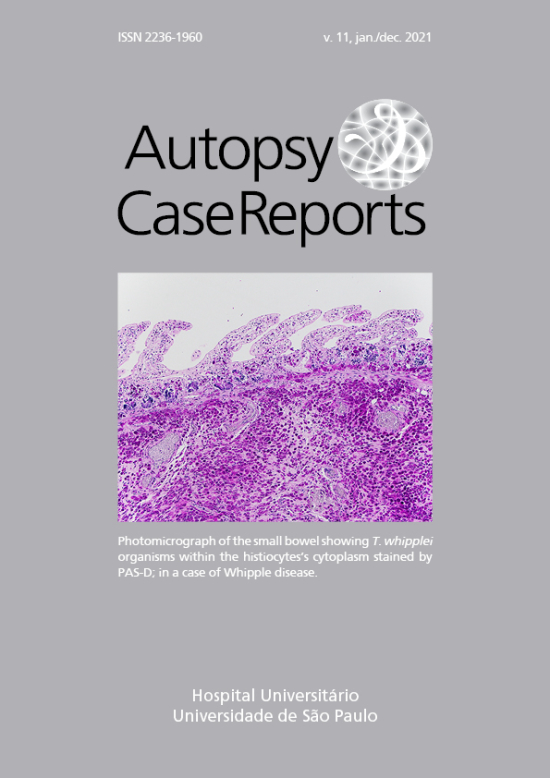Palbociclib in breast cancer neoadjuvant setting
DOI:
https://doi.org/10.4322/acr.2021.309Keywords:
Breast Neoplasms, Cyclin-Dependent Kinase 4, Cyclin-Dependent Kinase 6, Case ReportsAbstract
Cyclin-dependent kinase 4/6 inhibitors represent a major advance in breast cancer treatment, emerging as the standard of care of the initial treatment of hormone receptor-positive and HER2-negative metastatic breast cancer. Their activity in this subset of patients leads to interest in their use in the adjuvant and neoadjuvant settings. This case report presents a real-life case of cyclin-dependent kinase 4/6 inhibitors use in a patient initially considered to have stage IV luminal HER2-negative breast cancer with liver metastasis. The discrepancy of treatment response between the breast tumor and liver node led to a repetition of the liver biopsy, which revealed metastasis of a neuroendocrine tumor of unknown primary. The breast tumor showed a partial response, and the initial therapeutic strategy was then redefined for curative intent. While cyclin-dependent kinase 4/6 inhibitors are not yet approved for clinical practice in the neo / adjuvant treatment of hormone receptor-positive breast cancer, this case report portrays a successful example of its application in a neoadjuvant setting.
Downloads
References
Litière S, Isaac G, De Vries EG, et al. RECIST 1.1 for response evaluation apply not only to chemotherapy-treated patients but also to targeted cancer agents: a pooled database analysis. J Clin Oncol. 2019;37(13):1102-10. http://dx.doi.org/10.1200/JCO.18.01100. PMid:30860949.
Ogston KN, Miller ID, Payne S, et al. A new histological grading system to assess response of breast cancers to primary chemotherapy: prognostic significance and survival. Breast. 2003;12(5):320-7. http://dx.doi.org/10.1016/S0960-9776(03)00106-1. PMid:14659147.
Gao JJ, Cheng J, Bloomquist E, et al. CDK4/6 inhibitor treatment for patients with hormone receptor-positive, HER2-negative, advanced or metastatic breast cancer: a US Food and Drug Administration pooled analysis. Lancet Oncol. 2020;21(2):250-60. http://dx.doi.org/10.1016/S1470-2045(19)30804-6. PMid:31859246.
He S, Roberts PJ, Sorrentino JA, et al. Transient CDK4/6 inhibition protects hematopoietic stem cells from chemotherapy-induced exhaustion. Sci Transl Med. 2017;9(387):eaal3986. http://dx.doi.org/10.1126/scitranslmed.aal3986. PMid:28446688.
Ma CX, Gao F, Luo J, et al. NeoPalAna: neoadjuvant palbociclib, a cyclin-dependent kinase 4/6 inhibitor, and anastrozole for clinical stage 2 or 3 estrogen receptor–positive breast cancer. Clin Cancer Res. 2017;23(15):4055-65. http://dx.doi.org/10.1158/1078-0432.CCR-16-3206. PMid:28270497.
Martin M, Hurvitz SA, Chan D, et al. Final results of NeoMONARCH: a phase 2 neoadjuvant study of abemaciclib in postmenopausal women with hormone receptor positive (HR+), HER2 negative breast cancer (BC). In: American Association for Cancer Research, editor. Cancer research. Philadelphia: AACR; 2018.
Johnston S, Puhalla S, Wheatley D, Ring A, Barry P, Holcombe C, et al. Randomized Phase II study evaluating palbociclib in addition to letrozole as neoadjuvant therapy in estrogen receptor-positive early breast cancer: PALLET Trial. Am J Clin Oncol. 2019;37(3):178-189
Curigliano G, Pardo PG, Meric-Bernstam F, et al. Ribociclib plus letrozole in early breast cancer: a presurgical, window-of-opportunity study. Breast. 2016;28:191-8. http://dx.doi.org/10.1016/j.breast.2016.06.008. PMid:27336726.
Cottu P, D’Hondt V, Dureau S, et al. Letrozole and palbociclib versus chemotherapy as neoadjuvant therapy of high-risk luminal breast cancer. Ann Oncol. 2018;29(12):2334-40. http://dx.doi.org/10.1093/annonc/mdy448. PMid:30307466.
Prat A, Saura C, Pascual T, et al. Ribociclib plus letrozole versus chemotherapy for postmenopausal women with hormone receptor-positive, HER2-negative, luminal B breast cancer (CORALLEEN): an open-label, multicentre, randomised, phase 2 trial. Lancet Oncol. 2020;21(1):33-43. http://dx.doi.org/10.1016/S1470-2045(19)30786-7. PMid:31838010.
Johnston SR, Harbeck N, Hegg R, Toi M, Martin M, Shao ZM, et al. Abemaciclib combined with endocrine therapy for the adjuvant treatment of hr+, her2-, node-positive, high-risk, early breast cancer (monarche). J Clin Oncol. 2020; 38(34):3987-98.
Mayer E, Gnant M, DeMichele A, et al. LBA12 Pallas: a randomized phase III trial of adjuvant palbociclib with endocrine therapy versus endocrine therapy alone for HR+/HER2-early breast cancer. Ann Oncol. 2020;31:S1145. http://dx.doi.org/10.1016/j.annonc.2020.08.2240.
Bhattacharya K, Yang Y. A cost-effectiveness analysis of palbociclib and other aromatase inhibitors for treatment of advanced breast cancer. Value Health. 2016;19(3):PA150. http://dx.doi.org/10.1016/j.jval.2016.03.1589.
Matter-Walstra K, Ruhstaller T, Klingbiel D, Schwenkglenks M, Dedes K. Palbociclib as a first-line treatment in oestrogen receptor-positive, HER2-negative, advanced breast cancer not cost-effective with current pricing: a health economic analysis of the Swiss Group for Clinical Cancer Research (SAKK). Breast Cancer Res Treat. 2016;158(1):51-7. http://dx.doi.org/10.1007/s10549-016-3822-z. PMid:27277747.
Downloads
Published
Issue
Section
License
Copyright (c) 2021 Autopsy and Case Reports

This work is licensed under a Creative Commons Attribution 4.0 International License.
Copyright
Authors of articles published by Autopsy and Case Report retain the copyright of their work without restrictions, licensing it under the Creative Commons Attribution License - CC-BY, which allows articles to be re-used and re-distributed without restriction, as long as the original work is correctly cited.



